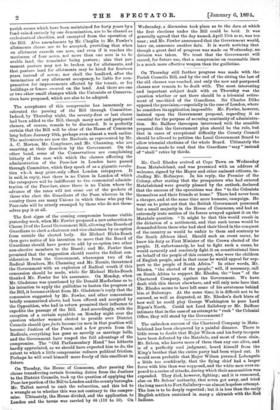Mr. Cecil Rhodes arrived at Cape Town on Wednesday from
Matabeleland, and was presented with an address of welcome, signed by the Mayor and other eminent citizens, in eluding Mr. Hofmeyer. In his reply, the Premier of the Colony, after stating that the prospectors who had entered
Matabeleland were greatly pleased by the outlook, declared that the success of the operations was due "to the Colonists. themselves and their friends at home." There had never been a cheaper, and at the same time more humane, campaign. He went on to point out that the British Government possessed but a small majority in the House of Commons, and had an extremely irate section of its forces arrayed against it on the Matabele question. " It might be that this would result in the dictation of a settlement, and that such terms would be demanded from those who had shed their blood in the conquest of the country as would be unfair to them and contrary to• the South African ideal. Should such an event occur, he- knew his duty as First Minister of the Crown elected of the people. If, unfortunately, he had to fight such a cause, he would earnestly and resolutely fight it on constitutional lines-- on behalf of the people of this country, who were the children. of English people, and in that cause he would appeal for sup- port to the people of South Africa." In other words, Mr.. Rhodes, " the elected of the people," will, if necessary, call on South Africa to support Mr. Rhodes, the "boss " of the Chartered Company, against the Government. We have• dealt with this threat elsewhere, and will only note here that Mr. Rhodes seems to have left some of his astuteness behind him at Bnluwayo. At the same time, it is difficult not to be amused, as well as disgusted, at Mr. Rhodes's dark hints of how well he could play George Washington to poor Lord Ripon's North. Could not Lord Salisbury or Mr. Balfour- intimate that in the case of an attempt to " rush " the Colonial Office, they will stand by the Government ?










































 Previous page
Previous page